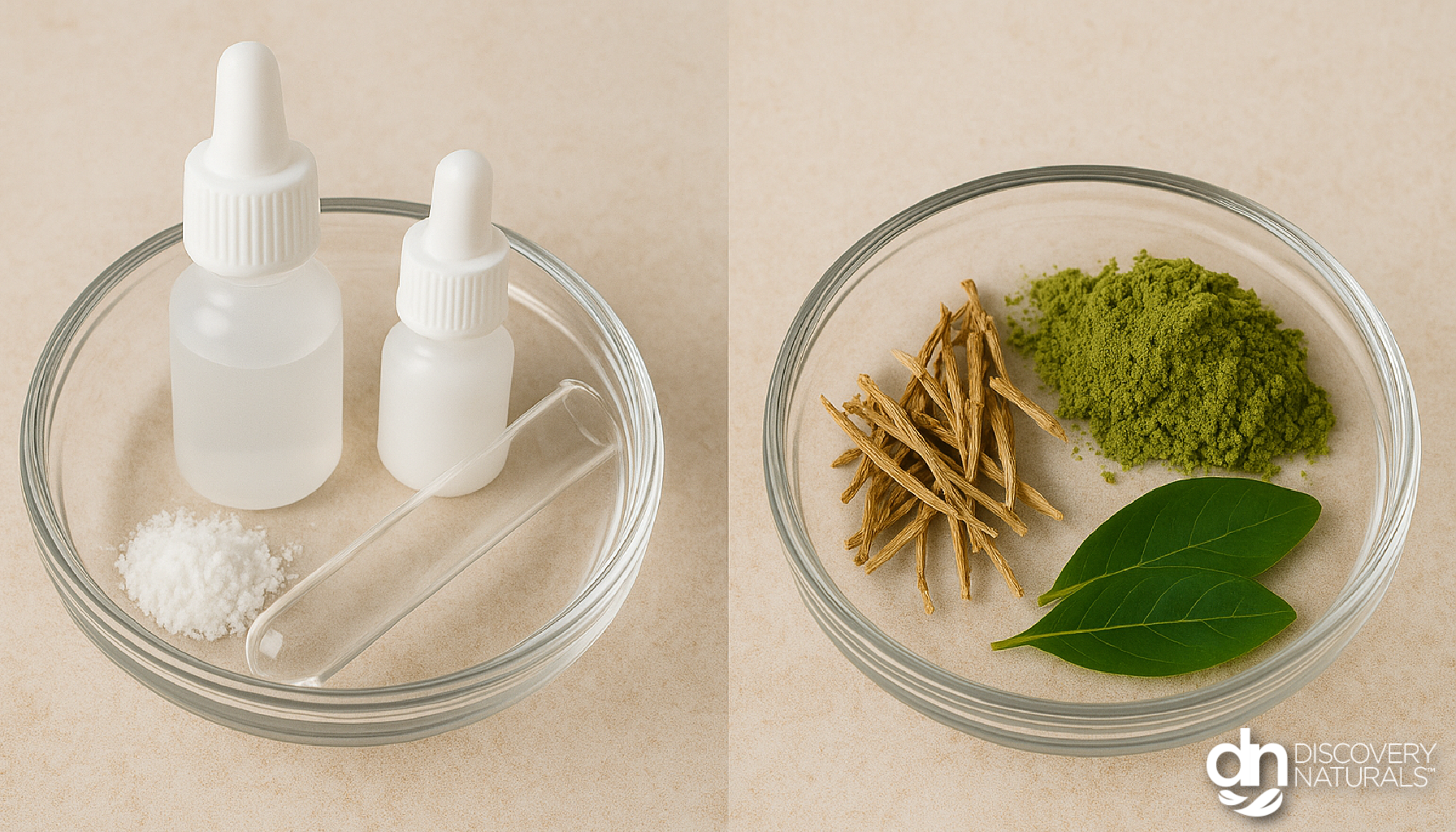If you've ever stood in the hair dye aisle feeling torn between the latest ammonia-packed color kit and the "all-natural" box boasting plant-based ingredients—you're not alone. With so many options out there, it can be tricky to know which type of hair dye is best for you. The good news? You're in the right place.
At Discovery Naturals, we're passionate about helping people understand the power of natural hair dye, especially henna-based options. But we also know there are pros and cons to everything. So, let’s break it down in a way that actually helps you make a confident, informed choice.
What’s the Difference Between Natural and Chemical Hair Dye?
Chemical hair dyes work by using ingredients like ammonia, PPD (para-phenylenediamine), and hydrogen peroxide to open the hair cuticle and force pigment inside. The result? Fast, intense color—often with a high price for your hair health.
Natural hair dyes, especially henna and herbal blends, use plant-based colorants that coat the hair rather than penetrating it. Think of them like a botanical glaze—offering color, shine, and nourishment all in one.

Pros of Natural Hair Dye
1. Safer for Your Scalp and Skin
No ammonia. No PPD. No harsh chemicals. That means less risk of irritation, allergies, or burning—especially important for those with sensitive skin.
2. Conditions While It Colors
Natural dyes like henna bind to your hair's natural keratin, strengthening it and leaving it shinier, thicker, and healthier over time.
3. Eco-Friendly & Cruelty-Free
Because they’re made from plants, natural dyes are biodegradable and safer for the environment. And if you're using Discovery Naturals, you can be confident no animals were harmed in the process.
4. Long-Lasting Color (That Fades Gracefully)
Henna doesn't fade in patches the way chemical dyes often do. It wears down gradually, creating a more natural transition between touch-ups.
Want to know more about the natural benefits of henna? Check out our Comprehensive Guide to Natural Hair & Beard Dye.
Cons of Natural Hair Dye
1. Fewer Shade Options
You won’t find neon blue or icy platinum in the henna aisle. Most natural dyes come in earth-toned shades like auburn, brown, and black.
2. Requires More Prep Time
Mixing and applying natural dyes—especially henna—takes more time and planning. You’ll often need to let the paste sit and oxidize before applying.
3. Not Great for Drastic Color Changes
Natural dyes can darken or enhance your existing color, but they can’t lighten it. So if you're going from black to blonde, this isn't your path.
4. May Take a Few Tries for Full Gray Coverage
Henna builds color over time, so if you’ve got stubborn grays, you might need two applications to get full coverage.
Curious about how to get the best gray coverage with henna? Read our blog on Choosing the Right Natural Hair Dye for Your Hair Type.
Pros of Chemical Hair Dye
1. Wide Range of Colors
From pastel pinks to platinum blondes, chemical dyes can give you almost any shade imaginable.
2. Quick Results
You can dye your hair in under an hour and walk out with dramatic, high-impact color.
3. Easy to Find at Salons and Drugstores
Most salons are familiar with chemical dyes, and you’ll find countless options at your local beauty store.
Cons of Chemical Hair Dye
1. Damages Hair Over Time
Ammonia and peroxide strip your hair’s natural moisture and weaken the strands. Over time, this can lead to breakage, frizz, and thinning.
2. Harsh on Your Scalp
Many people experience stinging, itching, or allergic reactions from the chemicals in synthetic dyes.
3. Bad for the Planet
Chemical hair dye runoff can contribute to water pollution, and many brands still test on animals.
4. Fades Fast and Unevenly
Unlike henna, chemical dyes often fade unevenly and require more frequent touch-ups.
Want to extend your color’s life naturally? Don’t miss our Maintaining & Prolonging Henna Hair Color blog.
So... Which One Should You Choose?
It really depends on your hair goals and lifestyle.
-
Choose natural hair dye if you want healthier hair, longer-lasting natural color, and a more sustainable beauty routine.
-
Choose chemical hair dye if you're going for a dramatic transformation or need a specific shade that natural options don’t offer.
FAQ: Quick Answers
Can I switch from chemical to natural dye?
Yes! But it’s best to detox your hair first and do a strand test. Learn more in our Transitioning from Synthetic to Natural Henna guide.
Does henna really strengthen hair?
Absolutely. It bonds with your hair’s keratin, making strands stronger, shinier, and more resilient.
Can I lighten my hair with natural dye?
Not really. Natural dyes don’t lift color—they only deposit it. If you want to go lighter, chemical options are your only route.
Is henna safe for sensitive scalps?
Yes! It’s one of the safest ways to color your hair—especially when you’re using quality ingredients like those in Discovery Naturals.
No matter which path you choose, the most important thing is knowing your options—and understanding what works best for your hair, your goals, and your values.
Natural hair dye might take a bit more effort, but for many people, the rewards are well worth it. And with Discovery Naturals, you can get rich color and peace of mind.
Ready to make the switch? Explore our full collection of plant-based hair and beard dyes today.


